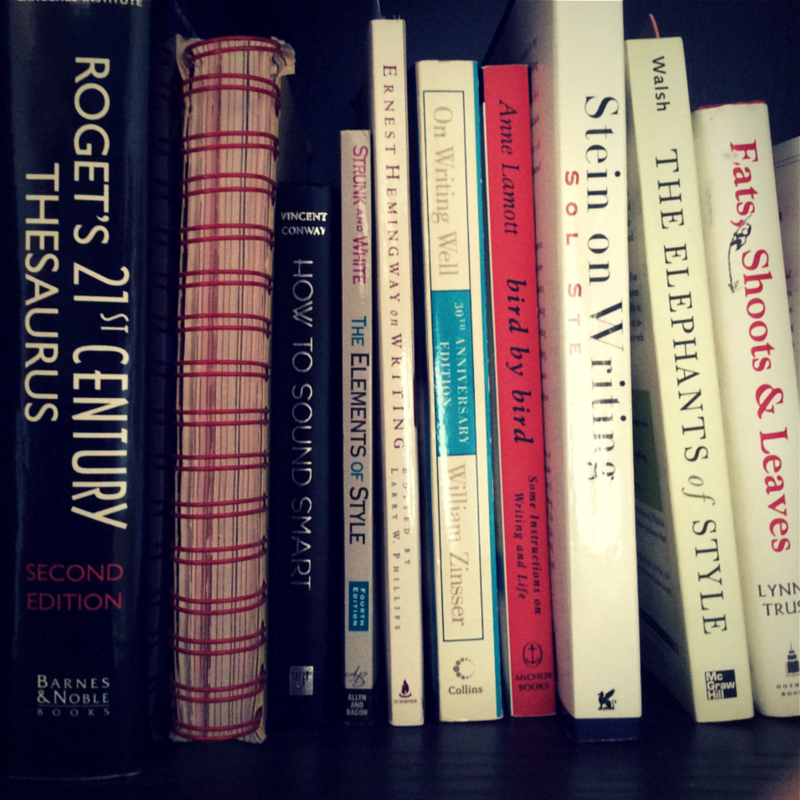
5 Writing Books That Have Made Me a Better, More Creative Writer
Former VP of Marketing @ Buffer
The bookshelf in my office holds a single shelf of paperback books that are very special to me. Amidst the nearby clutter of boxes and miscellany (I find the bookshelf is seldom used for books anymore) sits a row of my favorite writing books and reference guides, stacked chronologically from the time I bought them, each one brought down once a year or so for a fun refresher.
Some folks read the same novel multiple times for fun. I tend to read the same writing books for fun.

I’ve come across five favorites that have really meant a lot to me—either as sources of inspiration, sources of knowledge, or just plain good reminders that writing is a passion worth pursuing.
Here’s a list of my five favorites (plus a few extras that might make the list someday).
Bird by Bird
by Anne Lamott
I’ve loved everything that Lamott has written, starting with my adoration of this. It’s designed to be a treatise on writing, and it performs that job and then some. It finds a way to transcend writing advice and become a call for anyone who has ever harbored thoughts of creativity, ever needed an ounce of inspiration to keep trying, ever lived. It’s the writing book I come back to the most often, for writing reasons and so much more.
A favorite excerpt:
While others who have something to say or who want to be effectual, like musicians or baseball players or politicians, have to get out there in front of people, writers, who tend to be shy, get to stay home and still be public. There are many obvious advantages to this. You don’t have to dress up, for instance, and you can’t hear them boo you right away.
On Writing
by Stephen King
I read this book for the first time this year—I’ve never read any of his fiction, too scary and grisly for me. His writing advice, though? Pitch perfect. Anyone—a King fan or otherwise—can learn so much from his direct, detailed advice on every aspect of writing, much of which has to do with fiction and an equal part with writing in general. The first half of the book is a bit of an autobiography. The latter half is some of the best writing advice I’ve ever read, put in clear, actionable terms.
A favorite excerpt:
We are writers, and we never ask one another where we get our ideas; we know we don’t know.
On Writing Well
by William Zinsser
Zinsser’s stories and advice help put everything in perspective: Writing can be difficult at times, and for those who are up to the challenge, it pays off in grand ways. I appreciate how Zinsser lays everything out; a teacher at New York’s New School and the Columbia University school of journalism, he has a great sense for explaining the ins and outs of writing with clarity, depth, and importance.
A favorite excerpt:
There are all kinds of writers and all kinds of methods, and any method that helps you to say what you want to say is the right method for you.
Stein on Writing
by Sol Stein
This book was one of my first entries into the meta category of books on writing. I was blown away. Stein has the knack of putting words to the thoughts and ideas swirling around in my head, as if I would have known inherently what an orange was without ever knowings it had a name. Bingo. It’s called an orange, and all of a sudden I’m in this world where everyone speaks a language I understand and now learning the words. One of my favorite parts of Stein’s book is that he pulls such amazing examples to reference the lessons he shares.
A favorite excerpt:
All storytelling from the beginning of recorded time is based on somebody wanting something, facing obstacles, not getting it, trying to get it, trying to overcome obstacles, and finally getting or not getting what he wanted. What has interested listeners, readers, and viewers for centuries is available in the conscious use of desire in nonfiction.
The Elements of Style
by William Strunk & E.B. White
Perhaps the writing book of writing books, this one is the foundation for my grammar, punctuation, and spelling. But it goes beyond that even. While learning about the proper way to compose a sentence, I also learn about the reasons why: is this sentence necessary, how does it fit with the rest, what is it saying. These questions come up organically as a result of the fine attention to detail in the parts of the whole. Is the whole worth having? It’s a great question to ask, and it’s one that my writing is better for asking.
A favorite excerpt:
Vigorous writing is concise. A sentence should contain no unnecessary words, a paragraph no unnecessary sentences, for the same reason that a drawing should have no unnecessary lines and a machine no unnecessary parts. This requires not that the writer make all sentences short, or avoid all detail and treat subjects only in outline, but that every word tell.
9 other great writing books worth checking out
Try Buffer for free
140,000+ small businesses like yours use Buffer to build their brand on social media every month
Get started nowRelated Articles

As a self-proclaimed tools nerd, I’ve tested out many of the ever-growing list of AI productivity tools on the market. These are the ones I keep coming back to.

Looking for some low-lift ways to make yourself happier? Here's some of the best research that we've found on personal happiness.

Personal brand experts walked this writer through exactly how to switch up her personal brand — and offered some more general advice, too.